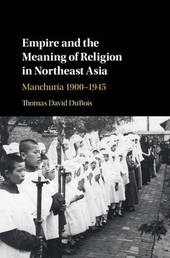
|
Empire and the Meaning of Religion in Northeast Asia: Manchuria 1900-1945
Hardback
Main Details
| Title |
Empire and the Meaning of Religion in Northeast Asia: Manchuria 1900-1945
|
| Authors and Contributors |
By (author) Thomas David DuBois
|
| Physical Properties |
| Format:Hardback | | Pages:260 | | Dimensions(mm): Height 234,Width 160 |
|
| Category/Genre | Asian and Middle Eastern history
Church history
Buddhism |
|---|
| ISBN/Barcode |
9781107166400
|
| Classifications | Dewey:200.951809041 |
|---|
| Audience | | Professional & Vocational | |
|---|
| Illustrations |
3 Maps; 18 Halftones, black and white
|
|
Publishing Details |
| Publisher |
Cambridge University Press
|
| Imprint |
Cambridge University Press
|
| Publication Date |
24 December 2016 |
| Publication Country |
United Kingdom
|
Description
Manchuria entered the twentieth century as a neglected backwater of the dying Qing dynasty, and within a few short years became the focus of intense international rivalry to control its resources and shape its people. This book examines the place of religion in the development of Manchuria from the late nineteenth century to the collapse of the Japanese Empire in 1945. Religion was at the forefront in this period of intense competition, not just between armies but also among different models of legal, commercial, social and spiritual development, each of which imagining a very specific role for religion in the new society. Debates over religion in Manchuria extended far beyond the region, and shaped the personality of religion that we see today. This book is an ambitious contribution to the field of Asian history and to the understanding of the global meaning and practice of the role of religion.
Author Biography
Thomas David DuBois is a leading scholar of religion in East Asian history, and is the author of Religion and the Making of Modern East Asia (Cambridge, 2011) and Sacred Village: Social Change and Religious Life in Rural North China (2005). His work has been published in Arabic, Chinese and Russian translation.
Reviews'Few scholars in the world can match DuBois' knowledge of the modern religious and political histories of China and Japan. In this book he applies that knowledge to Manchuria, a state whose history has already revolutionized global historical thinking about relations between tradition and modernity, the national and the cosmopolitan. An impressive new contribution to scholarship on the politics of religion.' Kiri Paramore, Leiden University, author of Japanese Confucianism: A Cultural History 'In this exhilarating and original study of early twentieth-century Manchuria in global context, Thomas DuBois paints a lively picture of the politics and history of spiritual governance in a time and place that seems far removed from our own - but isn't as far as you might think. From an original and provocative account of the Boxer Uprising, to the politics of knowledge generation in Japanese and East Asian social science circles, to the designation of certain groups as 'religious bandits' in the Japanese owned Shengjing Times, to the politics of religious freedom and Protestant and Catholic mission in Japanese colonial Manchukuo, to the emergence of philanthropy as a civic sphere distinct from religion by groups such as the Daoyuan and the World Red Swastika Society, this book never quits. A fascinating, fun and indispensable read for anyone interested in the shifting and entangled fields of spirituality, sovereignty, empire, nationalism, and law.' Elizabeth Shakman Hurd, Northwestern University
|